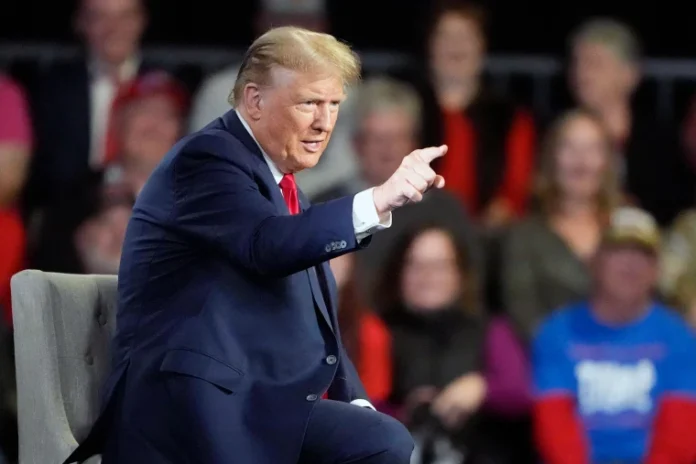Donald Trump ballot case: The United States Supreme Court expected to give at least one verdict on Monday, the day before Colorado‘s presidential primary election, in which a lower court barred Republican frontrunner Donald Trump from running for office for participating in an uprising during the Jan. 6, 2021 attack on the US Capitol.
In an uncommon Sunday schedule modification, the Supreme Court did not indicate the verdict it would announce. However, on February 8, the justices heard arguments in Trump’s appeal of the Colorado case and are expected to make their conclusion.
Colorado is one of 15 states and a US territory that will conduct primary elections on “Super Tuesday.” Trump is the leader for the Republican nomination to face Democratic President Joe Biden in the November 5 presidential election.
The Republican Party of Colorado has requested the Supreme Court, which has a 6-3 conservative majority that includes three Trump-appointed justices, to decide on ballot eligibility by Tuesday.
During arguments, Supreme Court justices expressed sympathy for Trump’s appeal of a Dec. 19 verdict by Colorado’s highest court that disqualified him from the state’s ballot under the 14th Amendment of the United States Constitution.
Section 3 of the 14th Amendment prohibits any “officer of the United States” from retaining public office after taking an oath “to support the Constitution of the United States” and then “engaged in insurrection or rebellion against the same, or given aid or comfort to the enemies thereof.”
Trump supporters stormed police and flooded the Capitol, attempting to prevent Congress from confirming Biden’s 2020 election victory. Trump had already delivered an impassioned speech to supporters, instructing them to travel to the Capitol and “fight like hell.” He then refused to halt the mob for hours, despite repeated appeals.
Anti-Trump groups have attempted, mainly unsuccessfully, to disqualify him in more than two dozen additional states for his conduct in connection with the January 6 attack. Maine and Illinois have also prohibited Trump on the ballot, though both verdicts are on hold until the Supreme Court’s Colorado decision.
During arguments in the Colorado case, Supreme Court justices, both conservatives and liberals, voiced worry about states taking broad acts that may have a national influence on the presidential election. They discussed how states may appropriately implement the Section 3 disqualification wording against candidates, with some questioning if Congress must first approve legislation to accomplish this.
In another high-stakes election case, the Supreme Court agreed on Wednesday to hear Trump’s claim of immunity from prosecution for attempting to reverse his 2020 loss to Biden.
According to legal experts, the court is certain to reject Trump’s claim of immunity from prosecution, but its decision to spend months on the case may boost his bid to reclaim the president by postponing a huge criminal trial.
Trump’s attorneys have claimed that he should be immune from prosecution for attempting to overturn Biden’s victory because he was president at the time, a broad claim of immunity that lower courts have flatly rejected.
However, the Supreme Court’s decision not to hear arguments on the subject until late April diminishes the likelihood that a trial on Special Counsel Jack Smith’s election subversion allegations would be completed before the presidential election.
